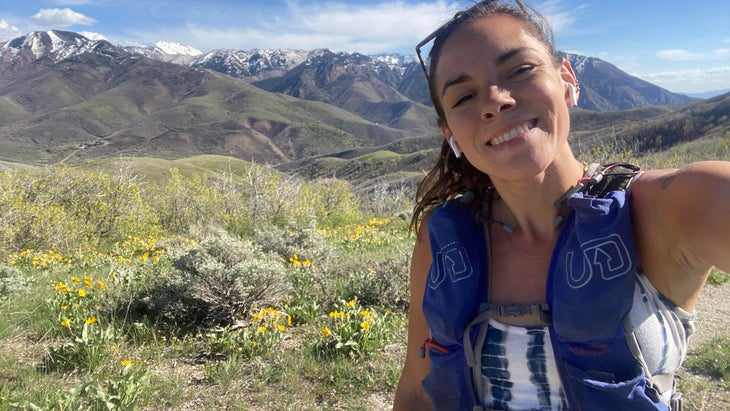Step into the evo Hotel, and the Great Hall buzzes: people lounge on the lobby’s leather couches, retail workers help customers tune their bikes, and climbers stroll through with shoes in hand and chalk on their pants. Past the front desk, skateboarders shred the ramps and rails of the 5,000-square-foot indoor park, and in the cozy alcove under the steps, remote workers sit on plush pillows, typing away on laptops.
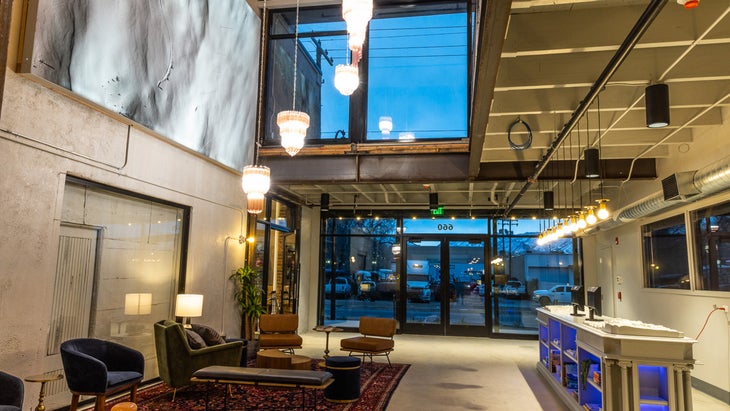
Over a weekend in April, I stayed at the evo Hotel for two nights for a media ski trip. After checking in, I headed to my room, which was modern with exposed brick walls and industrial detailing, yet homey with a king bed, a ski rack in the corner, music system, and a cute patio (although covered with snow at the time ). Downstairs, I rented gear from the evo Salt Lake store to ski Snowbasin the next day. After I filled out some information, the staff equipped me with Rossignol skis and Atomic Hawx Magna boots—tailored to my intermediate ability on a monster powder day.
For years, outdoor enthusiasts had to choose between campgrounds, rustic cabins, hostels, mountain lodges and bougie resorts. But the rise of outdoor-adventure hotels like Evo helps travelers to find the middle ground so they can enjoy comfortable beds and amenities, all with a laid-back atmosphere and a community feel. These lodges cater to those visiting for outdoor sports by providing high-quality gear rentals and demos suitable for all or most levels of interest and ability. Evo, for example, has both hardtail and enduro mountain bikes, depending on your riding style. Its ski and snowboard rentals come from reputable brands.
After the first day of our trip, Anna Dimond, a fellow writer and experienced snowboarder, wanted to try a different setup, and the rental shop suited her up and offered clear explanations about the attributes of each suggested board. “Ten out of 10 I would rent there again instead of schlepping my own old board,” she said. “Bonus [of the stay] was being able to try out new gear and adjust to the conditions.”
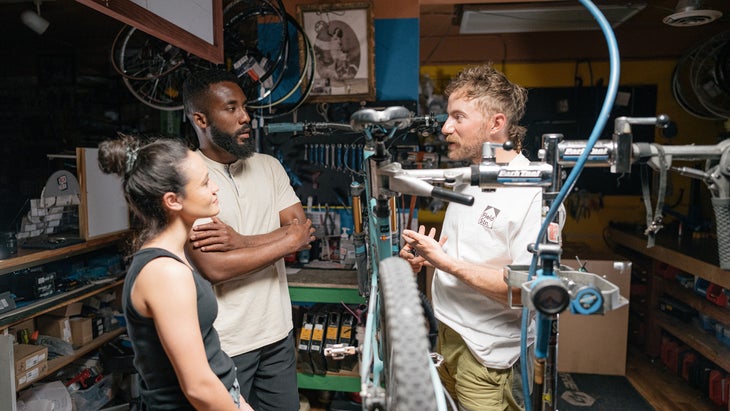
While evo has the essentials, like bikes, snowboards, and skis, the place also offers a whole array of camping gear and hard goods like coolers, chairs, and tables that may be too bulky to lug around on an airplane, or for people who just want to test out new outdoor products, such as a Patagonia Black Hole backpack or Black Diamond Moji Charging Station Lantern.
Communal spaces are another fundamental aspect of outdoor-adventure hotels. Whether in hotel lobbies, designated coworking spaces, or evening-hangout campfire rings with s’more supplies, common areas create the opportunity for guests to interact and connect over the day’s adventures. Guided excursions and group experiences, offered at some places such as Field Station and LOGE Camps, provide more time to mix with other travelers, sort of like at hostels but without the shared bedrooms and 3 AM wake-ups as the drunk gap-year kids roll back in.
As the new type of lodging gains popularity, many brands, including evo, have—or are planning to open—numerous locations across the United States, mostly out West. Here are some of my favorite outdoor-adventure hotels options open now.
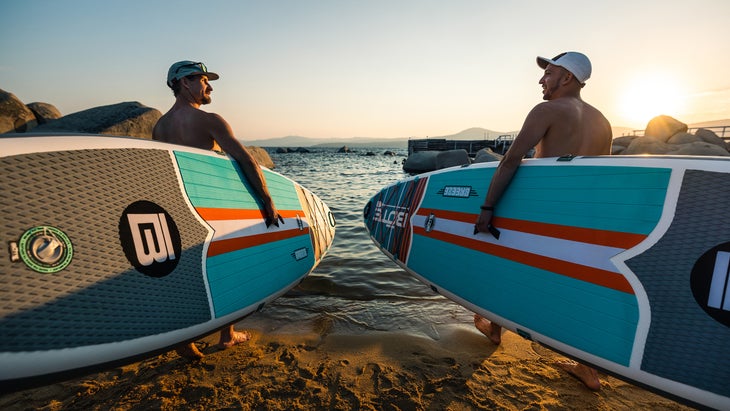
Evo Hotel: Salt Lake City, Utah
At evo, it’s easy to forget you’re in a hotel; it feels more like a community space—and that’s intentional. Onsite, you’ll find a climbing gym (the Salt Lake Bouldering Project), a gear-rental shop within the evo Store, the All Together Skate Park, two adjacent outdoor retail stores, and a rooftop bar with views of the Wasatch Mountains. The former 100,000-square-foot warehouse retains structural elements such as original brick walls and exposed beam ceilings from its days as a granary, street art decorates the walls, and each room features artwork from local artists. Hotel visitors get day passes to the climbing gym, which also offers yoga and fitness classes. As you walk around the property, you’ll see just as many locals as visitors, as people get their bikes or skis serviced, and climbers ranging from beginners to pros train at the Bouldering Project. (From $145 to $253 a night)
Field Station: Moab, Utah
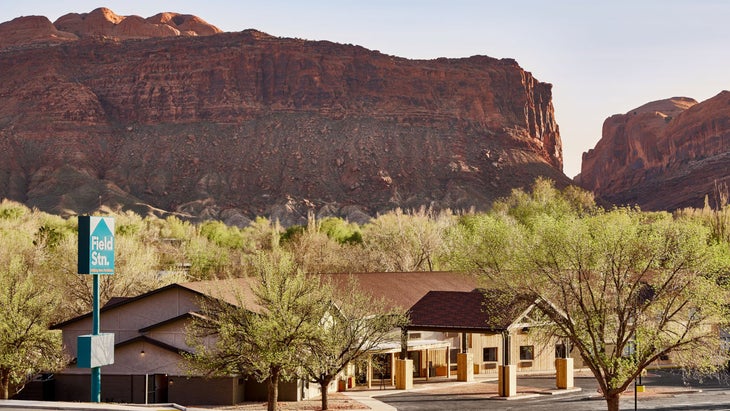
Field Station, a new outdoor-adventure lodging sub-brand of the Autocamp Hospitality Group, recently opened its first location, in Moab, Utah—within striking distance of Arches and Canyonlands National Parks. The hotel’s charcoal-gray exterior contrasts with the surrounding red rock walls, while the rooms have a minimal aesthetic, with raw-wood fixtures and plenty of gear storage. Well-thought-out touches include outdoorsy coffee-table books and hangboards mounted above door frames. A variety of room types—from king-bed suites to bunk rooms to van-life parking spots—accommodate travelers of all different budgets. (From $128 to $255 a night)
On the property, there’s a pool to escape the desert heat, and guests can sign up for guided experiences or rent gear to explore the area on their own. Field Station is slated to open a Joshua Tree location in fall 2023.
LOGE Camps: Washington, Oregon, and California
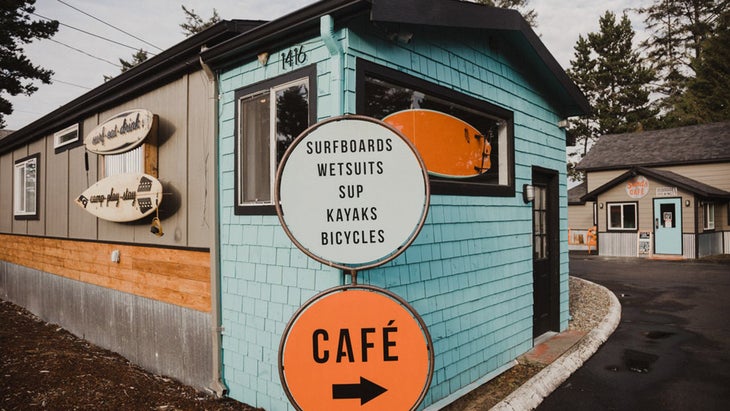
Another outdoor-lodging brand, LOGE Camps, has seven locations across Washington, Oregon, and California that are inspired by ’70s surf and road-trip culture, with six additional sites set to open throughout 2023. Whether you want to climb the peaks or go bouldering around Leavenworth, Washington; hike around the volcanic terrain on the flanks of Mount Shasta, California; or surf in the chilly waters of the Washington coast in Westport, LOGE properties are located in the heart of outdoor towns with plentiful public-land access. Repurposing old motels, LOGE offers campsites, family-style bunk rooms, or standard hotel rooms. Plus, all of their properties are dog-friendly, so you won’t have to worry about whether or not you can bring your pup along.
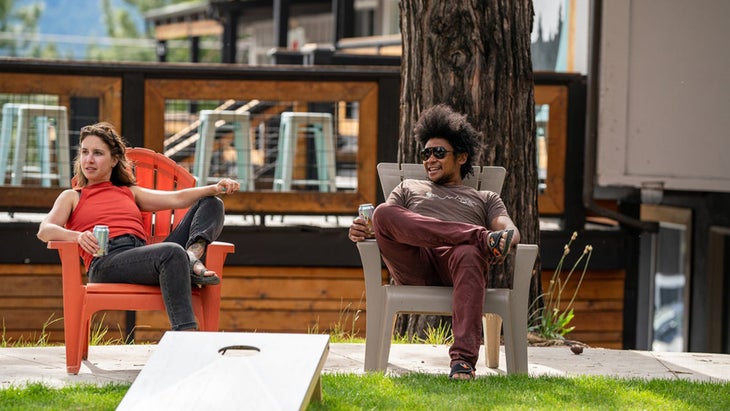
Four of LOGE’s locations (in Leavenworth and Westport, Washington; Mount Shasta, California; and Bend, Oregon) have gear-rental centers, and depending on the region, you can check out big items like cross-country skis, surfboards, SUP boards , or full-suspension mountain bikes. Browse the rental website to reserve in advance, and you will find detailed descriptions of demo boards, bikes and other gear. While the gear is generally suitable for beginners to experienced practitioners, experts who want the lightest and most advanced products may prefer to bring their own. (From $98 to $315 a night)
Gravity Thirst: Colorado and California
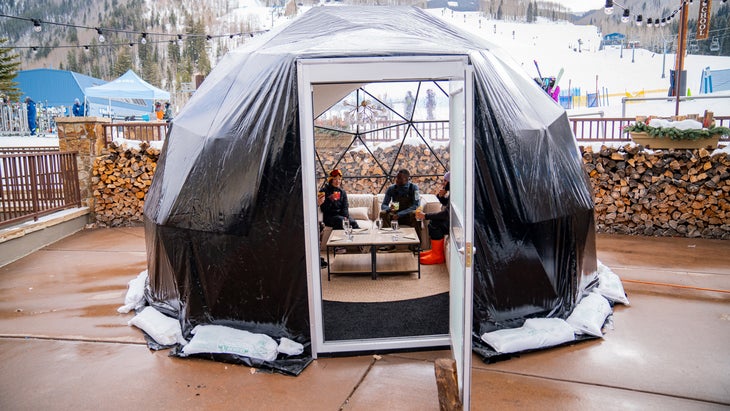
Gravity Haus, a Colorado-based lodging brand and self-proclaimed social club, falls within the same realm of outdoor-adventure hotel. It has locations across Colorado, including Vail, Breckenridge, Winter Park, and Steamboat Springs, and one hotel in Truckee-Tahoe, California—with another property set to open in Aspen, Colorado, this December. The facility offers slightly elevated amenities, like fitness classes and recovery facilities such as cold plunges and saunas, but maintains a down-to-earth vibe. Frequent travelers or locals can purchase a membership that offers day access to the property, including the fitness center, co-working space, and gear demos.
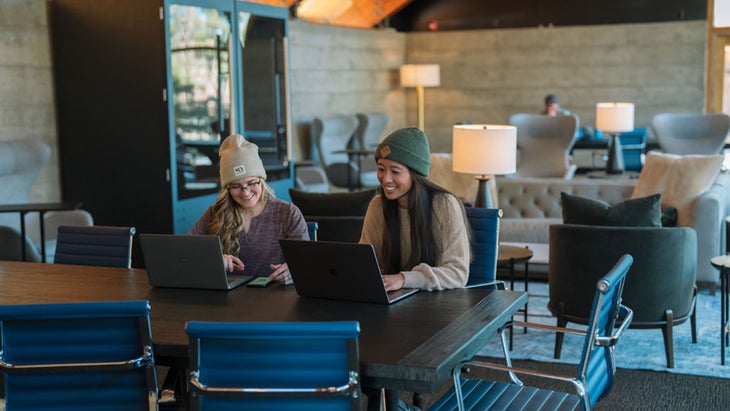
Similar to evo, Gravity Haus has one of the most substantial gear-rental programs in the bunch, through its in-house Haus Quiver, which offers backcountry gear and avalanche-rescue equipment as well as more standard setups. However, the place does not demo ski or snowboard boots, so you’ll have to bring your own. For bikes, you can choose between enduro, trail, cross-country, and gravel, from brands like Specialized, Spot, and Commencal. (From $240 to $526 a night)
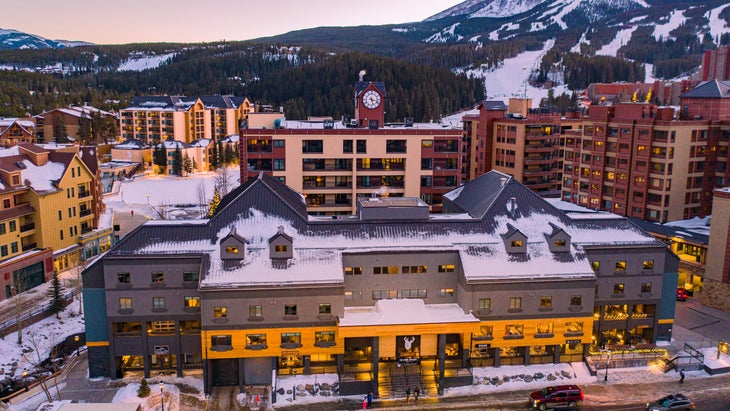
Outdoor-adventure hotels are a niche, enabling people to stay connected to the outdoors without having to rough it, or to travel easily without the hassle of flying with skis or a bike. They also create a built-in community in an unfamiliar place, a chance to make meaningful connections over ski tracks or s’mores wherever you go.
Hannah Singleton is a Salt Lake City-based outdoor journalist who travels around the western US for both work and play. While she used to spend nearly every night of the summer sleeping on the ground as a backpacking guide (and still camps often), she now feels the draw of a cushy bed, vibrant community, and fast wi-fi when on the road.
